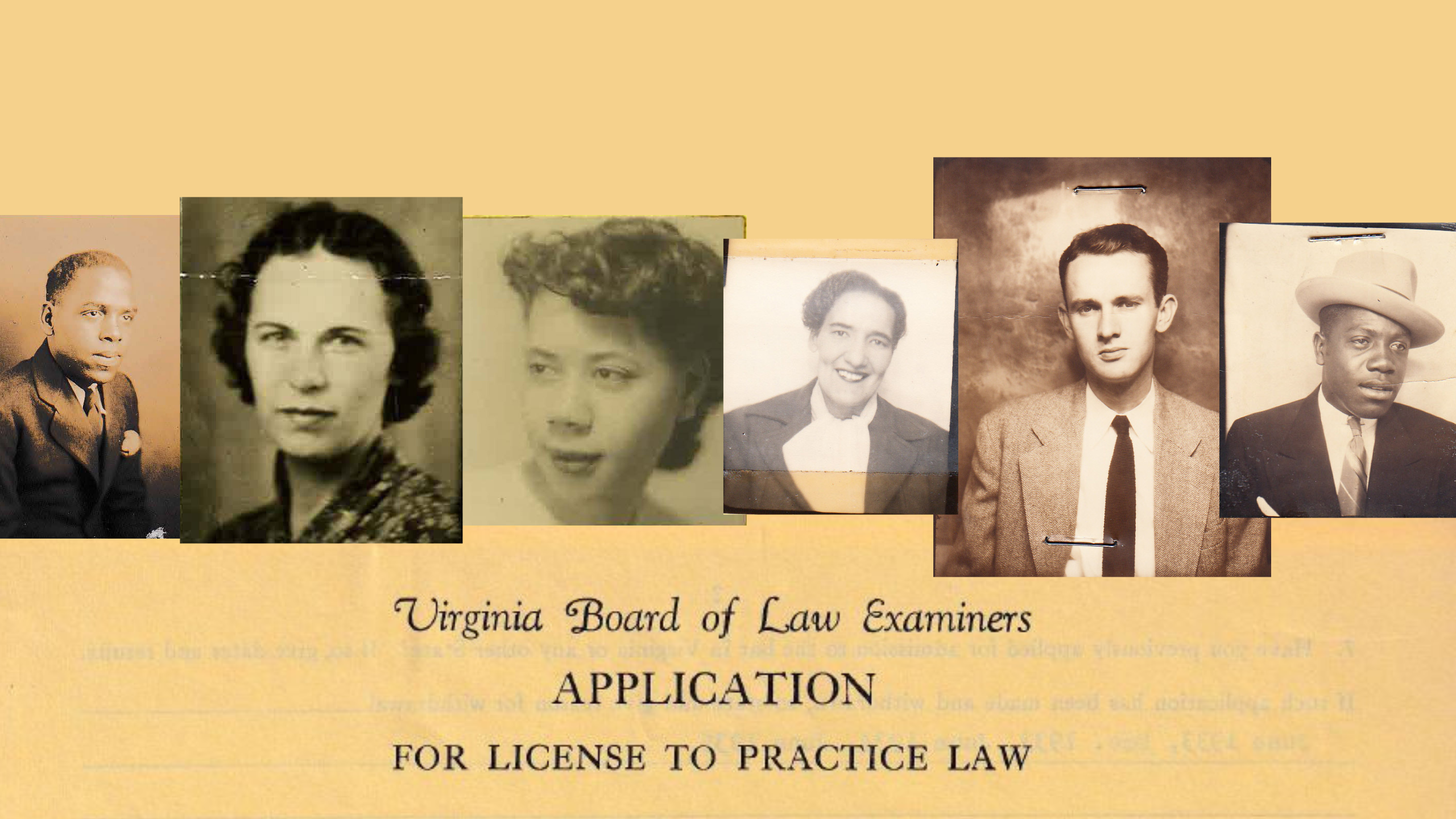Practicing law in Virginia has not always been a straightforward process. The Virginia Board of Bar Examiners was established by an act of the General Assembly on March 14, 1910. Before that, lawyers were admitted to the bar by the judges of the courts in which they intended to practice; there was no centralized approval process. Starting in 1910, the Governor appointed a Board of Examiners to license lawyers. The Board operated under the auspices of the Supreme Court of Appeals until it became a separate department and was placed under the Supreme Court of Virginia in 1972. The Chief Justice appoints the five-member Board for a five-year term; the Board then elects one of its members to serve as its president.
The primary responsibility of the Virginia Board of Bar Examiners is to determine the qualifications of applicants to take the bar examination. Applicants may be graduates of law schools or they may have “read for the bar,” which is a less formal way of preparing that usually includes an apprenticeship with a licensed attorney. The Board is directly involved in preparing, conducting, and grading the examinations to satisfy the requirements. The bar examination is given twice each calendar year. The Board of Bar Examiners also has the power to revoke a license issued for “good cause.”
Recently, I processed the Virginia State Board of Bar Examiners records from 1910 through 1970. These important records can illustrate how the Board has operated and evolved throughout the twentieth century. The collection is arranged into two series: Series I: Correspondence and subject files, 1910-1970; and Series II: Applications, 1913-1950. Included are applications, correspondence, financial records, minutes, reports, and subject files documenting the work of the Virginia Board of Bar Examiners.
The correspondence and subject files contain correspondence to the state board, along with the board’s response. Topics relate to the bar examination, including where and when to take the exam, submitting payment for the exam, and retaking the exam. The application files contain an abundance of information, including the applicant’s name, birth date and location, education and law school certification, employment history, residence, references, location where they want to practice, and date of their examination. The applications may also contain correspondence, certificates from law schools attended, military certificates, and character references. The earlier applications often simply consist of correspondence, recommendations, and county court certificates. The first “application” that we have in the collection is a letter written by Early S. Fields in 1913, enclosing a fifteen-dollar fee to take the examination. It wasn’t until 1935 that we see formal applications, and from 1936 to 1950, the applicants’ files included photographs.
Access to the practice of law has not always been equal. From the references I found, the first African American woman licensed to practice law in Virginia was Lavinia Marian Poe. Lavinia Marian Poe was born in Warwick County, Virginia, on August 13, 1890, and died in Newport News, Virginia, on March 20, 1974. She attended Howard University Law School and passed the Virginia bar in 1925. She had a practice in Newport News and was married to Abram James Poe.1 Unfortunately, we do not have a copy of her application to the board. One of the first women to practice law before the state’s federal court was Belva Lockwood in 1879.2 She was born in Royalton, New York, on October 24, 1830, and died in Washington, DC, on May 19, 1917. She attended George Washington University Law School and obtained her diploma in September 1873.
Notable Applications
1936, George Jones
George Russia Jones was born in Lynchburg in 1907, studied at Virginia Union University, and apprenticed at the law offices of J. H. Fulcher in Suffolk. He applied to take the bar exam six times, including this application in which he explains it was submitted late due to his wife’s illness.
1947, Thelma Diggs
Thelma Ione Diggs was born in Norfolk in 1910. She attended Virginia State College and Howard University Law School before applying to take the Virginia bar exam. The correspondence shows that the Board would not accept a letter of reference from the dean of Howard University; they only accepted proof of educational requirements from in-state schools.
1948, Wescott Northam
Virginia-born Wescott Brownlee Northam attended the University of Virginia for undergraduate and law school, then worked in the U.S. Patent Office. Wescott Northam went on to be a Commonwealth’s Attorney and a judge in the General District Court and Juvenile and Domestic Relations Court for the Eastern Shore, and he was the father of Governor Ralph Northam.
The Virginia State Board of Bar Examiners Records collection has been processed and a finding aid is available.
Do you have a family member who was a lawyer in Virginia? Come check out the collection and see if you can find their application!
Footnotes
[1] Denise Watson, “Lavinia Marian Poe became first African American woman licensed to practice law in Virginia,” Daily Press, Feb. 29, 2020 and “Lavinia Marian Poe became the first black woman licensed to practice law in Virginia,” The Virginian Pilot , Feb. 29, 2020.
[2] “Belva Lockwood, Lawyer, Dies at 85,” New York Times, May 20, 1917.












